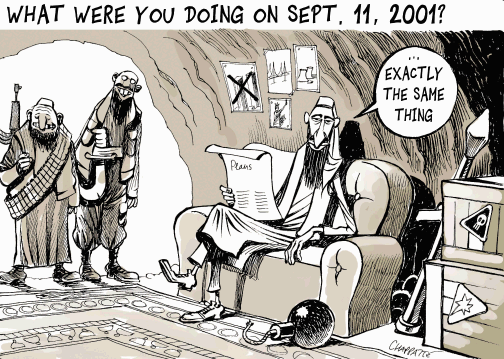 By CLIFFORD D. MAY Scripps Howard News Service September 11, 2007
 By: Patrick Chappatte - Le Temps, Switzerland Distributed to subscribers for publication by Cagle Cartoons, Inc.
It's also true that Iraq is not the only place where al Qaeda can be found. But, al Qaeda cells operate in secret in most countries. If we're lucky, some of them are under surveillance by intelligence or law enforcement as, apparently, they have been in Germany. Top al Qaeda leaders, including Osama bin Laden and Ayman al-Zawahiri, are believed to be living in the remote reaches of northwest Pakistan. Pakistani authorities have been unable -- some would say unwilling -- to do what is necessary to root them out. And American troops have not been invited to accompany Pakistani troops on search-and-destroy missions. That leaves Iraq, the theater in which we find al Qaeda's most active and lethal members. Or rather, that was the situation until very recently. A year ago, al Qaeda in Iraq (AQI) was firmly in control of Anbar and other Sunni areas, and sections of Baghdad as well. Then, this summer, Army Gen. David Petraeus took command of the 28,000 reinforcements he needed to change course in Iraq. He decided to target the root cause of the sectarian violence: the AQI terrorists who were suicide-bombing mosques and markets in an attempt to foment a civil war from which they expected to benefit. He also began to challenge the Iranian-backed Shia militias that had gained power by responding to the AQI attacks. Now, American troops, working with Iraqi Security Forces, have eliminated AQI command structures, safe havens and bomb factories in and around Baghdad, Baqubah and other former strongholds. They have killed thousands of AQI members. Among them: Mehmet Yilmaz, a Turkish-born al Qaeda leader, and a close associate of Khalid Sheikh Mohammed, the mastermind of the 9/11 attacks. Yilmaz was killed June 23 -- just five days after the last of Petraeus' reinforcements arrived in Iraq. Petraeus has redeployed American troops out of fortified Forward Operating Bases and into such cities as Ramadi and Fallujah. It was widely expected that putting more Americans in more vulnerable places would mean more casualties. In fact, American combat deaths have dropped by half in the three months since U.S. forces reached full strength. Why? Petraeus has provided security for Iraqis -- a mission that American troops were not performing before his arrival. In return, Iraqis are helping provide security for American troops. They also have been providing the actionable intelligence needed to fight effectively against AQI, the common enemy. And that brings us to the other way the United States is now damaging al Qaeda: in the war of ideas. The news is getting out that Iraqi Arab Muslims are freely choosing to align with Americans and against al Qaeda. This calls into question al Qaeda's ideology and even its legitimacy - its claim to be the champion and protector of the world's Muslims. If Muslims in the heart of the Middle East reject al Qaeda and side with Americans, that sends a message to Muslims around the world that al Qaeda is neither invincible nor unchallengeable. If the tribes of Anbar are not giving up their traditions and customs to embrace bin Laden's version of Islam, why should Indonesians and Bosnians? We now have a chance to seriously degrade AQI -- which American intelligence calls the "most visible and capable (al Qaeda) affiliate and the only one known to have expressed a desire to attack the (U.S) homeland." We now have a chance to deliver a painful physical, psychological and intellectual blow to global al Qaeda -- to demonstrate who the "strong horse" really is. Al Qaeda's hope: that Congress will save them by legislating America's retreat from Iraq; that lawmakers in Washington will vote to stop fighting al Qaeda in Iraq and to abandon those Iraqis who have been fighting with us and relying on us. Six years after 9/11, in the midst of a global conflict against al Qaeda and its enablers, is there a more serious mistake we could make?
a policy institute focusing on terrorism. Distributed to subscribers for publication by Scripps Howard News Service, http://www.scrippsnews.com
|